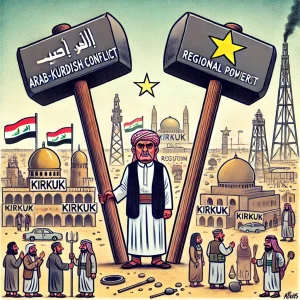By: Torhan Al-Mufti
When a new idea or a specific philosophical trend emerges, the proponent of that idea or trend begins to theorize based on their visions. Consequently, this individual transforms into several personas, and as the number of individuals increases, the initial ideological crystallization deepens, attracting more adherents to this new ideology or philosophical trend. After a certain period, a specific ideology on a particular subject emerges, with believers and defenders. To protect the new ideology, it inevitably produces within its ranks extremist individuals with a violent disposition towards opposing ideologies.
The Manufacturing of Ideologies The manufacturing of ideologies typically occurs in one of two ways. It either emerges randomly as a result of incidental dialogues sparking an idea in someone’s mind, which then undergoes refinement before being presented to others, or it arises as a response to a societal problem needing resolution. In the latter case, a group of individuals gathers around the problem to develop a new ideology perceived to solve it. This process encompasses various ideologies, starting from societal ideologies, passing through religious ideologies or what’s referred to as jurisprudential schools, and culminating in political ideologies and the manufacturing of parties and political movements.
The ultimate goal of all ideologies is to provide a specific lifestyle and living formula for adherents to the idea, and subsequently for others, whether they hold different ideas or are neutral. However, there is no closed geographical area for any particular ideology, necessitating the development of a coexistence behavior with those who do not adhere to it.
We must not overlook the possibility of failure by proponents of an ideology to achieve collective coexistence for some reason. Failure could lead to the emergence of extremist and racist institutions that crystallize the lifestyle of adherents while marginalizing or even eliminating others, under the pretext of “you’re either with us or against us.” Based on these premises, political movements in the country, especially from 1958 to 2003, have evolved.
Since 2003, there has been a shift in ideologies, with various political movements, parties, and directions emerging from extreme right to extreme left. While there may be attempts to supplant certain ideologies with others, all ideologies have somewhat maintained a certain geographical presence within the country.
Regionally, the situation varies from one country to another, but the focus is more on preserving geography than maintaining power (unlike recent Iraqi political movements seeking positions and serving power). Democratic practices in the region have entrenched and perpetuated the deepening of ideologies in the societies of these countries. While this might seem normal and logical in the region, the rooting of a political project and idea implies a transition from political decisions to sovereign decisions at the state level, hence a specific decision at the level of regional states, and such measures may not be welcomed by major players at different levels.
Ending and Fragmenting Ideologies Certainly, ideologies can be ended and fragmented through the following methods:
Firstly, by combating the leaders and proponents of the ideology and restricting them within their geography. While this may yield immediate results, its long-term impact is relatively short-lived, as the same ideology and philosophical trend may resurface, perhaps even stronger due to changes in leadership.
Secondly, by combating the ideology with another ideology. This approach requires a longer time frame to accomplish but yields longer-lasting results. In rare cases, there may be an extremist decision to merge the two approaches, resulting in a quick outcome. However, the reaction can be extremely violent, sometimes leading to the collapse of the opposing ideology and the persistence of the old ideology, along with the growth of an extremist and violent apparatus.
What’s Happening in the Region? What’s happening in the region, especially after 2010, is the process of ending and fragmenting major ideologies and changing thought, not in any of the previously mentioned forms but in a completely different manner. This involves remote manipulation, pitting proponents of new ideas against old ones, leading to distortion of the opposing thought and old ideologies, without producing a comprehensive new ideology. Fragmenting these ideologies into sub-ideologies initially contributes to the emergence of unstable and undermining societal trends lacking the potential for genuine intellectual construction. This is because they did not undergo either of the aforementioned processes in the manufacturing of ideologies, but rather were manufactured as a result of injecting ready and mature ideas into the application sphere of the region’s countries. Furthermore, the original proponents are absent and do not belong to the society where the new ideology is introduced. States succumbing to such agendas consequently become destabilized, lacking significant solutions, as seen in countries that underwent regime changes or experienced what was called the “Arab Spring,” and its repercussions on neighboring countries.
What About Iraq? Iraq is currently witnessing a significant struggle towards establishing and fragmenting major ideologies among its various components. This is achieved by endorsing the manufacturing of emerging ideologies within different concepts, which may not succeed due to the overcrowded Iraqi political arena. The other method involves fragmenting dominant ideologies by supporting secondary or tertiary figures of these ideologies, through which fragmentation occurs, leading the country into internal conflicts within narrower levels, represented by each component individually. This will inevitably affect the nature of the relationship between the country’s different components, with some seeking dominance by any means necessary, while others resist domination.








Be First to Comment